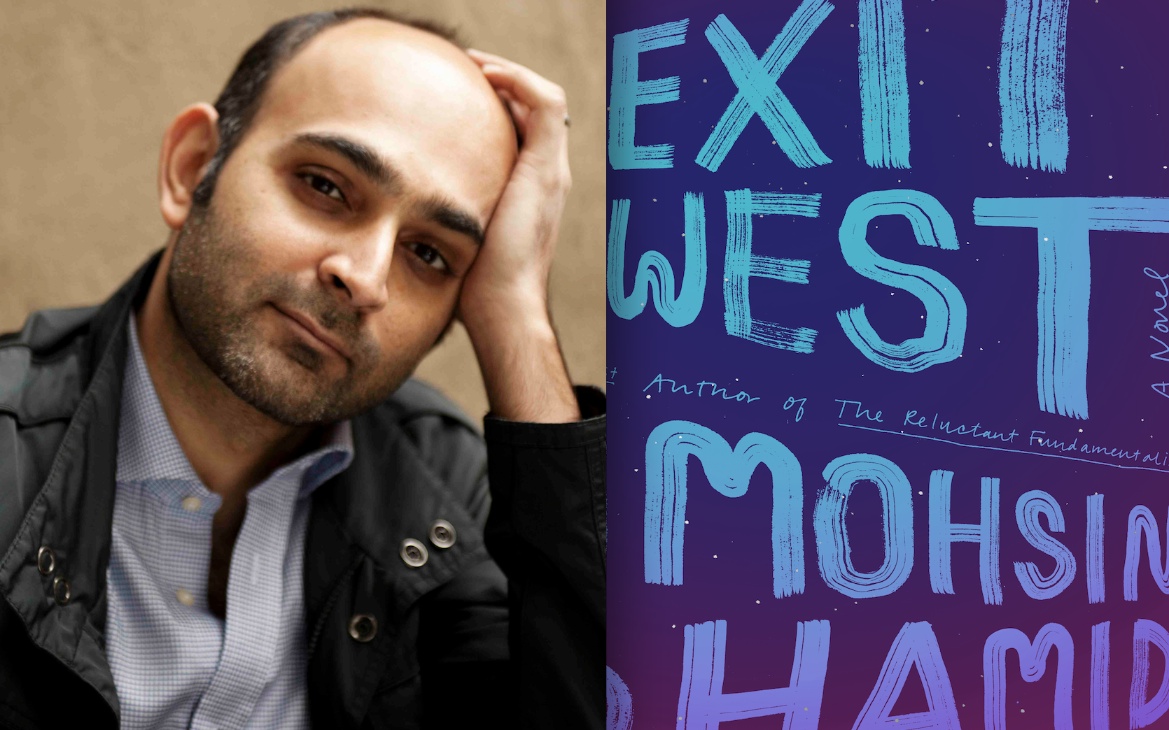The blazing new novel from Mohsin Hamid opens with this sentence: “In a city swollen by refugees but still mostly at peace, or at least not yet openly at war, a young man met a young woman in a classroom and did not speak to her.”
In “Exit West,” Nadia is “always clad from the tips of her toes to the bottom of her jugular in a flowing black robe,” a garb she will wear throughout her life. When Saeed meets her, they are taking an evening class on corporate identity and product branding, which seems like a sly reference to Hamid’s marvelous 2013 book “How to Get Filthy Rich in Rising Asia.”
Saeed watches the robed Nadia don a motorcycle helmet and swing a leg over her motorbike before rumbling off. Later, over their first coffee, he is surprised to learn she doesn’t pray. Asked why she then wears religious garb, Nadia smiles over her cup at Saeed and says: “So men don’t f*** with me.”
In his taut and profound fourth novel, Hamid picks up the classic boy-meets-girl storyline and weaves it into a nuanced, melancholy love story of global significance. At age 45, the Anisfield-Wolf winner for “The Reluctant Fundamentalist” has delivered a story at once familiar and utterly new, a fable unlike any yet told.
In a tale inhabited by militants, migrants and cell phones, Hamid introduces his first element of magical realism: dark, door-like portals that the reader gradually realizes are opening up around the world. As is his wont, Hamid never names the couple’s home city. But as the place succumbs to “sandbagged checkpoints and razor wire,” helicopters, then howitzers and infantry, Saeed and Nadia reluctantly decide to pay a smuggler to move them through a portal.
“Exit West” moves forward – in very short, moving passages — to other distinct spots on the planet – Mykonos, Greece; Sydney, Australia; Tijuana, Mexico; Tokyo, Japan; La Jolla, California; coastal Namibia, London, Buenos Aires, Argentina and Amsterdam. In these last two cities a garden shed becomes a portal that connects two elderly men, unable to speak one another’s languages, who nonetheless grow fond. A war photographer witnesses “their very first kiss, which she captured, without expecting to, through the lens of her camera, then deleted, later that night, in a gesture of uncharacteristic sentimentality and respect.”
Hamid gives this vignette a lovely gravitas in eight short paragraphs; he is poetic as he suggests that untold beauty might arise on occasion if we could foil the arbitrariness of geography. In 2013, the writer told National Public Radio’s Morning Edition that he takes “six or seven years to write really small books. There is a kind of aesthetic of leanness, of brevity.”
So “Filthy Rich” was only 228 pages; “Exit West” is 231. Yet the novel is made of long, cool, scalloped sentences – one runs 276 words and still the reader hardly notices.
Hamid is emphatically a political writer; he anticipates and imbues “Exit West” with the present-day crisis. Rich countries are busy building walls even as refugees flee their “drone-crossed skies” by the millions. As these migrants emerge in new places, drones and satellite surveillance follow. Some violence travels with them and some violence awaits, new nights of shattering glass.
Nadia and Saeed respond differently to the threats; a great pleasure of “Exit West” is these characters’ complexity – alone, together and across time. Hamid’s portrait of them as a couple feels as authentic as anything fiction has mustered in the new millennium.
The writer gave Lit Hub an interview last year on “Exit West,” one of the most anticipated novels of 2017. He said, “I understand that people are afraid of migrants. If you’re in a wealthy country, it’s understandable that you might fear the arrival of lots of people from far away. But that fear is like racism: it’s understandable, but it needs to be countered, diminished, resisted.
“People are going to move in vast numbers in the coming decades and centuries. Sea levels will rise, weather patterns will change, and billions will move. We need to figure out how to build a vision for this coming reality that isn’t a disaster, that is humane and even inspiring.”
“Exit West” reads as a portal to that possibility.


